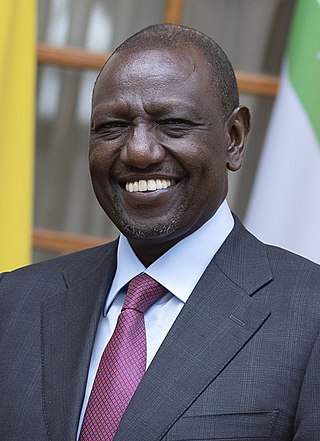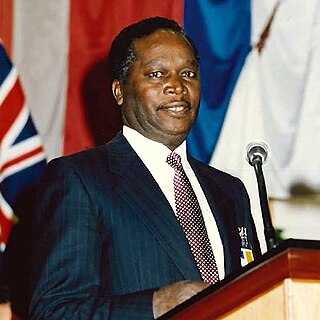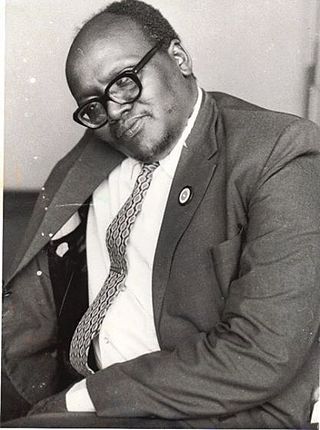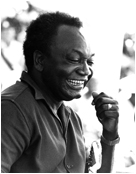
Daniel Toroitich arap Moi was a Kenyan politician who served as the second president of Kenya from 1978 to 2002. He is the country's longest-serving president to date. Moi previously served as the third vice president of Kenya from 1967 to 1978 under President Jomo Kenyatta, becoming the president following the latter's death.

The Kenya African National Union (KANU) is a Kenyan political party that ruled for nearly 40 years after Kenya's independence from British colonial rule in 1963 until its electoral loss in 2002. It was known as Kenya African Union (KAU) from 1944 but due to pressure from the colonial government, KAU changed its name to Kenya African Study Union (KASU) mainly because all political parties were banned in 1939 following the start of the Second World War. In 1946 KASU rebranded itself into KAU following the resignation of Harry Thuku as president due to internal differences between the moderates who wanted peaceful negotiations and the militants who wanted to use force, the latter forming the Aanake a forty, which later became the Mau Mau. His post was then occupied by James Gichuru, who stepped down for Jomo Kenyatta in 1947 as president of KAU. The KAU was banned by the colonial government from 1952 to 1960. It was re-established by James Gichuru in 1960 and renamed KANU on 14 May 1960 after a merger with Tom Mboya's Kenya Independence Movement.

The president of the Republic of Kenya is the head of state and head of government of the Republic of Kenya. The president is also the head of the executive branch of the Government of Kenya and is the commander-in-chief of the Kenya Defence Forces. The country's current president is William Ruto since 13 September 2022.

Uhuru Muigai Kenyatta is the fourth president of Kenya from 2013 to 2022. Kenyatta is the son of Jomo Kenyatta, Kenya's first president, and his fourth wife Mama Ngina Kenyatta. He has been married to Margaret Gakuo Kenyatta since 1991. They have three children: the two sons, Jomo and Muhoho, and a daughter, Ngina Kenyatta.

The Kenya African Union (KAU) was a political organization in colonial Kenya, formed in October 1944 prior to the appointment of the first African to sit in the Legislative Council. In 1960 it became the current Kenya African National Union (KANU).

Murang'a County is one of the counties of Kenya's former Central Province. Its largest town and capital is Murang'a, which was referred to as Fort Hall during the colonial era. The county is inhabited mainly by and is considered the birthplace of the Gikuyu, the largest ethnic group in Kenya. The county has a population of 1,056,640 based on the 2019 census.

Elections in Kenya take place within the framework of a multi-party democracy and a presidential system. The President, Senate and National Assembly are directly elected by voters, with elections organised by the Independent Electoral and Boundaries Commission (IEBC).

Josiah Mwangi Kariuki, popularly referred to as 'JM', was a Kenyan socialist politician during the administration of Jomo Kenyatta's government. He held different government positions from Kenya's independence in 1963 until his assassination in 1975.

Nicholas Kipyator Kiprono arap Biwott was a Kenyan businessman, politician, and philanthropist, who worked in the governments of the fathers of Kenyan independence, Jomo Kenyatta and Daniel arap Moi. He held eight senior civil servant and ministerial positions that included Minister of State (1979–82), Minister of Energy (1963), Minister of East African and Regional Co-operation (1998–99) and Minister of Regional Development, Science, and Technology (1982).

Kakamega County is a county in the former Western Province of Kenya. It borders Vihiga County to the South, Siaya County to the West, Bungoma and Trans Nzoia counties to the North and Nandi and Uasin Gishu counties to the East. Its capital and largest town is Kakamega. The county has a population of 1,867,579 and an area of 3,033.8 km2.

Kiambu County is a county in the former Central Province of Kenya. Its capital is Kiambu and its largest town is Thika town. Kiambu County is the second most populous county in Kenya after Nairobi County. Kiambu County borders Nairobi and Kajiado Counties to the South, Machakos to the East, Murang'a to the North and North East, Nyandarua to the North West, and Nakuru to the West. It has a population of 2,417,735.
George Moseti Anyona (1945–2003) was a politician from Kenya.

General elections were held in Kenya on 27 December 2002. Voters elected the President, and members of the National Assembly. They coincided with the 2002 Kenyan local elections.

Aden Bare Duale is a Kenyan politician currently serving as the Cabinet Secretary for Defence in the cabinet of President William Ruto, having assumed the position on 31 October 2022.

Jomo Kenyatta University of Agriculture and Technology (JKUAT) is a public university that is situated in Juja, 36 kilometres northeast of Nairobi, along the Nairobi-Thika SuperHighway, off Exit 15. It offers courses in Technology, Engineering, Science, Commerce, Management and Building sciences. The university has a strong research interest in the areas of biotechnology and engineering. Notable alumni include Dr. Paul Chepkwony, the first governor of Kericho County in Kenya and a former lecturer, Emma Miloyo, a prominent Kenyan architect and the first female president of the Architectural Association of Kenya, as well as Aden Duale, the former Leader of Majority in the 11th Kenyan Parliament among others. As at 2023, the Vice Chancellor of the University was Prof. Victoria Ngumi.

Jean-Marie Seroney was a Kenyan human rights advocate, legislator, and an Amnesty International prisoner of conscience. He was detained as a prisoner of conscience for 1,155 days.

Ronald Gideon Ngala (1923–1972) was a Kenyan politician who was the leader of the Kenya African Democratic Union political party from its creation in 1960 until its dissolution in 1964.

The presidency of Daniel arap Moi began on 22 August 1978, when Daniel arap Moi was sworn in as the 2nd President of Kenya, and ended on 30 December 2002. Moi, a KANU party member, took office following the death of the then president Jomo Kenyatta on the same day. He was sworn as interim president for 90 days during which the country was to prepare for a presidential election to be held on 8 November. Moi won reelections in 1988, 1992 and 1997, defeating Mwai Kibaki in the latter two elections. He was succeeded by Mwai Kibaki in 2002. He died at the age of 95 on 4 February 2020
The Hon. Dr. Patrick Musimba MP is a Kenyan politician and Member of the National Assembly representing the Kibwezi West Constituency in Makueni County.He is now vying for the gubernatorial seat of Makueni county in the 2022 elections. He was first elected to Parliament in March 2013 as an independent candidate, but announced in June 2019 that he was joining the Wiper party.
Mercy Gakuya is a Kenyan politician. She is a member of Jubilee Party and the member of parliament for Kasarani Constituency.

















